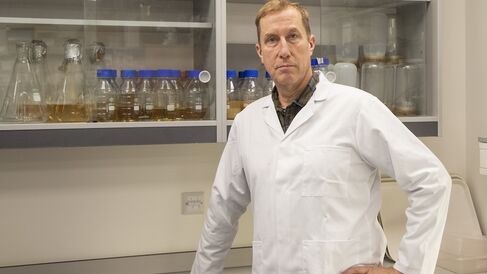Marc de la Roche

The Wnt pathway in normal homeostasis and disease.
The Wnt pathway is an intracellular series of events culminating on a gene expression program that regulates various biological outcomes. One such outcome is stem cell multipotency in the intestinal epithelia, a function responsible for the maintenance of a well-ordered monolayer of different cell types in a tissue roughly the area of an ice hockey rink. Oncogenic mutations in the Wnt pathway that are commonly found in colon cancer lead to spurious cell outgrowths equating to bumps in the surface of this ice rink – these are intestinal epithelial tumours. If the bumps are allowed to develop further oncogenic mutations, they may develop into colon cancer. Our laboratory is geared towards finding ways to prevent both the acquisition of tumours and the development of cancer.
Our research uses representative examples of the intestinal epithelia called organoids that we can: (i) grow in a tube and manipulate; and (ii) introduce specific oncogenic mutations or get rid of pre-existing ones. Through the use of organoids, we are identifying and modulating molecular circuitry with the goal of enforcing normal intestinal epithelial homeostasis.
Research objectives
Determine why the intestinal epithelia is particularly vulnerable to oncogenic mutations in the tumour suppressor APC.
Define whether the oncogenic form of the Wnt pathway is a bone fide therapeutic target in colon cancer.
Molecular and clinical characterization of a subset of colon cancer stratified by specific mutations in TCF7L2.
Key publications
Chen H-C, Mueller N, Stott K, Rivers E… de la Roche MA and de la Roche M. Novel immunotherapeutics against LGR5 to target multiple cancer types. EMBO Mol Med. 2024. doi: 10.1038/s44321-024-00121-2
Hanna J, Beke F, O'Brien LM, Kapeni C, Chen HC, Carbonaro V, Kim AB, Kishore K, Adolph TE, Skjoedt MO, Skjoedt K, de la Roche M, de la Roche M. Cell-autonomous Hedgehog signaling controls Th17 polarization and pathogenicity. Nat. Comms. 2022. doi: 10.1038/s41467-022-31722-5
Tovey CA, Tsuji C, Egerton A, Bernard F, Guichet A, de la Roche M, Conduit PT. Autoinhibition of Cnn binding to g-TuRCs prevents ectopic microtubule nucleation and cell division defects. J Cell Biol. 2021. doi: 10.1083/jcb.202010020
Diamante A, Chaturbedy PK, Rowling PJE, Kumita JR, Eapen RS, McLaughlin SH, de la Roche M, Perez-Riba A, Itzhaki LS. Engineering mono- and multi-valent inhibitors on a molecular scaffold. Chem. Sci. 2021. doi: 10.1039/D0SC03175E
Rannikmae, H., Peel, S., Barry, S., Senda, T, de la Roche, M. Mutational inactivation of Apc in the intestinal epithelia compromises cellular organisation. J. Cell Sci. 2021. doi: 10.1242/jcs.250019
Farooqi, AA, de la Roche, M, Djamgoz, MBA and Siddik, ZH. Overview of the oncogenic signalling pathways in colorectal cancer: Mechanistic Insights. Semin Cancer Biol. 2019. doi: 10.1016/j.semcancer.2019.01.001
Urbischek, M, Rannikmae, H, Foets, T, Ravn, K, Hyvonen, M, de la Roche, M. Organoid culture media containing growth factors of defined cellular activity. Scientific Reports. 2019.doi: 10.1038/s41598-019-42604-0
de la Roche M, Ibrahim AE, Mieszczanek J, Bienz M (2014). LEF1 and B9L shield b-catenin from inactivation by axin, desensitizing colorectal cancer cells to tankyrase inhibitors. Cancer Res., 74(5):1495-1505. doi: 10.1158/0008-5472.CAN-13-2682
de la Roche M, Rutherford T, Gupta D, Veprintsev DB, Saxty B, Freund SM, Bienz M (2012). An intrinsically labile α-helix abutting the BCL9-binding site of β-catenin is required for its inhibition by carnosic acid. Nat. Commun., 3:680. doi: 10.1038/ncomms1680
